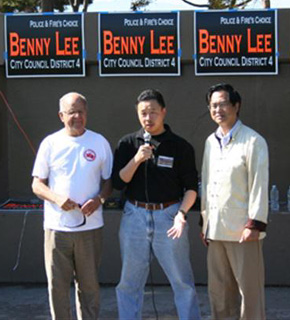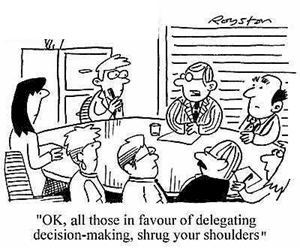 It’s worse than I thought, but is it intentional or just careless?
It’s worse than I thought, but is it intentional or just careless?
Just ask public officials, perhaps over a few beers, how they feel about the pesky public looking over their shoulder as they try to “get things done.” They hate it. Public oversight means they have to worry about following the law, hiding any corrupt deals and being held accountable for their actions.
As the corruption facilitated by secrecy has dire consequences for society at large (just think of the City of Bell), the California legislature long ago passed the Brown Act to guarantee the public notice and access to government meetings, and the California Public Records Act to grant access to government documents. Local governments have been trying to skirt them ever since.
I have noted before actual and threatened violations of these laws by the San Leandro City Council. Recently, I’ve become aware of a number of recurring and and very serious violations that allow the City Council to deliberate secretly. I’ve given the City the benefit of the doubt – perhaps nobody at City Hall is actually aware of the law or perhaps they’ve just been careless – and I’ve written to City officials* requesting that they cease these violations. How (and whether) they respond, and more importantly whether they actually comply with my request to obey the law, will be very indicative of the trustworthiness and ethics of our City Officials and our City Attorney.
The following are the Brown Act violations that I’ve discovered in the last few days
The City Council Appears to Have Deliberated Secretly on the Sale of the former Albertson’s Property
The City Council agenda for Feb. 6th, 2012 lists “Conference with Real Property Negotiators” as one of its closed session items. It says that they are currently negotiating the “price and terms of payment” with Innisfree Ventures II, David Irmer’s development firm. This implies that the City Council has already agreed to sell the former Albertson’s property to Irmer, or at least has discussed it; you don’t negotiate a price for a property you are not ready to sell. The Brown Act requires that any discussion on the sale of the property as well as any instruction to the City Manager (or anyone else) to initiate negotiations for the sale of the property, must be done in open session, after being properly agendized. A search of the agendas, minutes and other public records in the online Public Records Database maintained by the city, did not produce any records of such discussions or decisions. It would appear that these discussions were made informally or in closed session, in violation of the law.
The City Council Mislabels Public City Council Meetings as “Closed Sessions”
The City Council publishes agendas both for its open and closed sessions. Closed sessions usually start at 6PM and open sessions at 7PM. Agendas for closed sessions are labeled “Closed Session” while those for open sessions are labeled “Regular Meeting” or “Joint Meeting with Redevelopment Agency.” I was just informed by the City Clerk, however, that a portion of the meeting labeled closed session is actually an open session, in which the City Council can transact all sorts of business, including making required announcements. But as the meeting is not labeled “open session,” or “regular meeting” or anything other than “closed session,” the public has no reason to know that this is a meeting they are free to attend. The results are that practically nobody is likely to go to these meetings, and thus nobody witnesses what was said or not said there.
The City Council Fails to Include All Required Items in the “Open/Closed Session” Agendas
The Brown Act provides that “[n]o action or discussion shall be undertaken on any item not appearing on the posted agenda.” However, it would appear that actions and discussions not appearing in the agenda are actually carried out in what the City considers to be the “open” part of closed sessions (hereby described as “open/closed sessions”). This came to my attention on Friday, when I e-mailed the City Council et al. to alert them to the fact that while the Brown Act allows the City Council to meet in closed session with property negotiators, as it was itemized in the agenda for the Feb. 6th meeting, the negotiators’ identities must first be announced in open session. The City Clerk responded by saying that there would be an open session prior to the closed session in question, thus suggesting that the announcement would be made at that point. However, the agenda for that open/closed session only included two items: Roll Call and Public Comments. This is, indeed, the case with all the closed session agendas that I’ve seen. So it would appear that the City Council conducts business during these open/closed sessions that is not disclosed in the agenda
The City Council Fails to Keep Minutes of the “Open/Closed Session” Meetings.
California law requires the City Clerk to “keep a correct record of [City Council] proceedings”, and indeed, minutes and/or recordings** are produced and posted online for regular open session meetings. This does not appear to be the case, however, with respect to open/closed meetings. For example, there are no minutes for the Dec. 13th, 2010 open/closed session, even though a number of people (including myself) attended and made public comments at that meeting.
So basically we have a situation in which the City Council seems to 1) be holding public meetings without alerting the public about it, 2) not including all items to be discussed in the agenda and 3) not keeping minutes of those meetings – all in violation of state law.
There is yet another serious way in which the City violates the Brown Act:
The City Council Fails to Disclose the Subject of Anticipated Litigation
The Brown Act allows the City Council to meet in closed session to discuss exposures to litigation against the City. However, the law also provides that the closed session agenda must describe the “facts and circumstances” which have exposed the City to litigation, except when such facts are not known to the potential plaintiff. A quick look through a sample of City Council agendas from 1998 on suggests that those facts and circumstances are never disclosed, even in cases where it’s very clear that the potential plaintiff is quite aware of what those facts are (e.g. the murder of Gwendolyn Killings and the disagreement with Dan Dillman about the use of the Bal Theatre).
The disclosure of this information is very important for the public as it allows San Leandrans to keep a closer tab on how the City is fulfilling its legal obligations towards the community. A plethora of circumstances that make litigation against the Police Department likely, suggests that there are serious troubles with that institution. The City Attorney’s judgement that the City may be sued for employment discrimination or Brown Act violations, will shine some light into what’s going on at City Hall. Litigation is also very expensive, so it behooves the public to keep a close eye on what the City is doing to bring about lawsuits against it.
I find this pattern of violations of Open Meeting laws to be very disturbing. I can only hope that they will be addressed immediately by our City Officials. I will keep you posted of any response I receive.
– * I sent my initial e-mail to Mayor Stephen Cassidy, City Council Members Michael Gregory, Ursula Reed, Diana Souza, Joyce Starosciak, Pauline Cutter and Jim Prola, City Attorney Jayne Williams, Community Relations Representative Kathy Ornelas and City Clerk Marian Handa. Handa responded to that message, also copying City Manager Chris Zapata and Assistant City Manager Lianne Marshall.
– ** Minutes and/or audio from meetings from January 2011 on can be found at http://www.sanleandro.org/depts/cityhall/council/audio/audiostream.asp


 Yesterday, a young woman was
Yesterday, a young woman was  Committee Members ask few questions, make fewer comments, decide to pass the buck back to the City Council.
Committee Members ask few questions, make fewer comments, decide to pass the buck back to the City Council. It’s worse than I thought, but is it intentional or just careless?
It’s worse than I thought, but is it intentional or just careless?